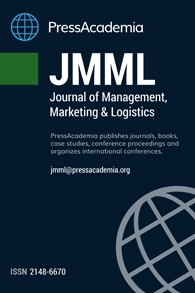TURKEY'S ROLE IN SILK ROAD ROUTES: ENERGY SUPPLY SECURITY OF EUROPEAN UNION AFTER UKRAINE – RUSSIAN WAR
TURKEY'S ROLE IN SILK ROAD ROUTES: ENERGY SUPPLY SECURITY OF EUROPEAN UNION AFTER UKRAINE – RUSSIAN WAR
Purpose- The aim of the research is to examine, analyze and provide insight into possible future projections of Turkey's role in the security of energy supply and the formation of new trade routes of the European Union (E.U.) after the Ukraine-Russia war within the scope of data obtained from experts. In addition, the current research has been understood that the EastMed project has reached a stalemate with Turkey's Exclusive Economic Zone (EEZ) agreement with Libya and has emerged due to the necessity of new solutions. In addition, turkey's strong position is mentioned, emphasizing that it is an important stakeholder in world politics and trade. Methodology- Since research requires expertise in a particular field, it is determined according to the purpose and scope of the research to be carried out with a specific focus group. The experts in the focus group were reached by the snowball sampling method. In this context, an in-depth interview technique from qualitative data analysis methods was carried out to a group of experts in international relations, international trade, and logistics departments. The research data were obtained from the faculty members and faculty members included in the group between 28.02.2022-09.03.2022 through Google Docs, and the analysis process was started. Findings- When the data obtained from the experts included in the research are examined, the perspective against the Tr-Med project, which is the recommendation of the research, is very positive. One reason is that the EastMed project is already known to be unsustainable, and in addition, the United States has withdrawn its support from the project. It can also be seen as the E.U.'s production of alternatives to existing energy supply processes in order to ensure energy supply security after the Ukraine-Russia war. In addition to the Tr-Med project, it is foreseen that the main routes of east-west-axis trade will shift to Turkey due to future sanctions against Russia. Conclusion- Turkey is foreseen to continue their union in the future because it is already a stakeholder of the E.U. in the TANAP project, has a partner in imports and exports, and is an actor who will play a role in the process of establishing relations with countries such as Iran, Israel, Egypt, Lebanon, Syria, and Qatar in the supply of energy supplies. However, the increase in freight prices in the post-COVID-19 period increased transportation costs, and in addition, the increase in raw material prices caused global inflation. With the Ukraine-Russia war, the price of crude oil at $130, experts say, will see $300 in oil in the future, which will make Turkey the E.U.'s manufacturing hub.
Keywords:
Energy security, pipeline, Eastern Mediterranean, naturel gas, Silk Road one belt and one road ınitiative,
___
- Apodaca, A. J., & Greensfelder, J. (2019). Pipeline or Pipe Dream: The Potential of Peace Pipelines as a Solution to Fragmentation and Energy Insecurity in the European Union. In Claremont-UC Undergraduate Research Conference on the European Union, 1, 1-5.
- Baş, T., & Akturan, U. (2017). Computer aided qualitative research methods in social sciences. Ankara, Turkey: Seçkin Publishing.
- (BBC, 2022). bbc.com/turkce/haberler-dunya-60263131. Accessed: 28.02.2022
- BP, (2021). https://www.bp.com/content/dam/bp/business-sites/en/global/corporate/pdfs/energy-economics/statistical-review/bp-statsreview-2021-full-report.pdf Accessed: 03.03.2022
- DW, (2022). https://www.dw.com/en/eu-moves-to-speed-up-energy-investments-amid-ukraine-war-rising-gas-prices/a-60957223 Accessed: 07.03.2022.
- ECEEE, (2022). https://www.eceee.org/policy-areas/energy-union/ Accessed: 01.03.2022
- Elliott, S. (2020): Infographic: East Mediterranean gas: monetization efforts pick up amid regional standoff (available at https://www.spglobal.com/platts/en/market-insights/latest-news/natural-gas/022820-east-mediterranean-gas-cyprus-turkey-egypt-eu). Accessed: 01.03.2022.
- Ge, Y., & Ho, K. C. (2022). Belt and Road Initiatives: implications for China’s internationalisation of tertiary-level education. Educational Research and Evaluation, 1-20.
- Hasanov, F. J., Mahmudlu, C., Deb, K., Abilov, S., & Hasanov, O. (2020). The role of Azeri natural gas in meeting European Union energy security needs. Energy Strategy Reviews, 28, 100464.
- Jpost, (2022). https://www.jpost.com/middle-east/article-694617 Accessed: 06.03.2022
- Kaveshnikov, N. (2010). The issue of energy security in relations between Russia and the European Union. European security, 19(4), 585-605.
- Kümbetoğlu, B. (2008). Qualitative methods and research in sociology and anthropology. İstanbul, Turkey: Bağlam Publishing.
- Leal-Arcas, R., Alemany Ríos, J., & Grasso, C. (2015). The European Union and its energy security challenges: Engagement through and with networks. Contemporary Politics, 21(3), 273-293
- Maltby, T. (2013). European Union energy policy integration: A case of European Commission policy entrepreneurship and increasing supranationalism. Energy Policy, 55, 435-444.
- Reuters, (2022). https://www.reuters.com/business/energy/us-voices-misgivings-eastmed-gas-pipeline-greek-officials-2022-01-11/ Accessed: 08.03.2022
- Reuters, (2022). https://www.reuters.com/business/energy/azerbaijan-set-boost-gas-supply-europe-this-year-double-capacity-future- 2022-02-23/ Accessed: 05.03.2022
- Ruble, I. (2017). European Union energy supply security: The benefits of natural gas imports from the Eastern Mediterranean. Energy Policy, 105, 341-353.
- TRT World, (2022). https://www.trtworld.com/magazine/are-azerbaijan-turkey-drills-meant-to-send-a-tough-message-to-iran-50556 Accessed: 08.03.2022
- Toraman, Y. (2021). E-para ve tokenler (dijital türk akçesi) ile borçlanma: dijital türk lirası (DTL) üzerine bir çalışma. Bilge Uluslararası Sosyal Araştırmalar Dergisi, 5 (2) , 124-134 . DOI: 10.47257/busad.1020347
- Tsakiris, T. (2018). The importance of East Mediterranean gas for E.U. energy security: The role of Cyprus, Israel and Egypt. Cyprus Review, 30(1), 25-50.
- Yayci, C. (2011). Libya's role and influence in limiting maritime jurisdictions in the Eastern Mediterranean. Journal of Security Strategies, 7(14), 17-41.
- Yıldırım, A., & Simşek, H. (2016). Qualitative Research Methods in Social Sciences, Ankara, Seçkin Publishing
- Yayın Aralığı: Yılda 4 Sayı
- Başlangıç: 2014
- Yayıncı: PressAcademia
